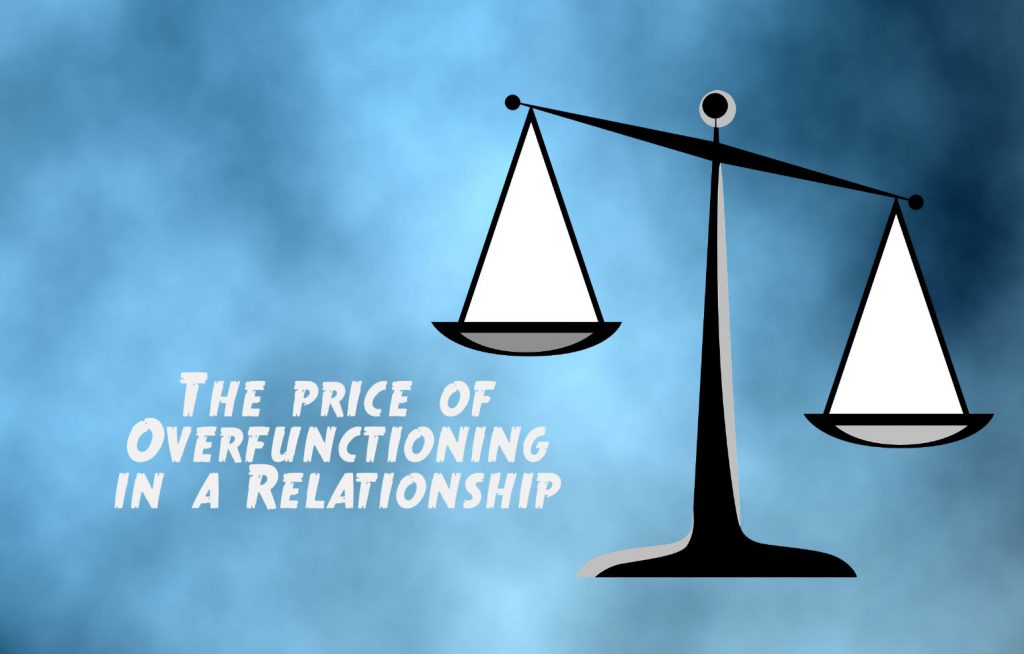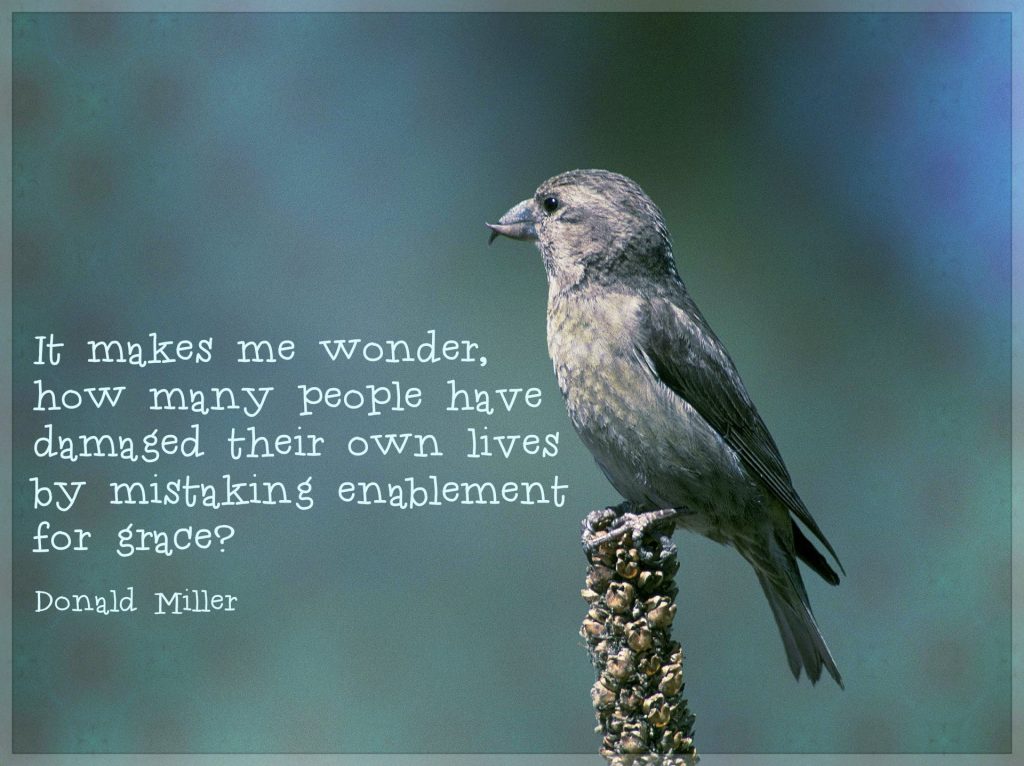My recent back injury taught me about the pain and discomfort when one set of muscles under function and another set of muscles compensate to overfunction.
But…drum roll please…Overfunctioning is a relationship killer.

Most of us grow up thinking being kind is a good thing.
And it is.
But kindness in a way that robs others of their ability to fulfill their roles in the world that is not kind.
That’s enablement.

Overfunctioning is treating someone as if they can’t do it for themselves.
It’s saying, “I don’t trust you to fold your laundry, so I’ll do it”.
Overfunctioning is disrespectful.
It’s saying, “I can’t see your abilities or trust them. Move over and I’ll do it. “
Overfunctioning is dismissive.
It’s saying, “I don’t believe you are capable of paying for it yourself, so of course I’ll buy it for you.” or “I will agree with you that you don’t need to participate, and not make us both uncomfortable by insisting that I need you to show up in our lives”
Overfunctioning is disempowering.
It’s taking away that feeling from someone. Y’know, that feeling–that rush that happens when you work hard and git’er done. That feeling of doing your job right. That feeling of, “I don’t feel like it, but I’ll help empty the dishwasher because I can contribute”. Gosh that feeling is good. That “I can put my head down on my pillow peacefully tonight for a job well done today” feeling. That, “whew, that was brave and hard and scary, but I DID IT!!” feeling.
Overfunctioners rob underfunctioners.
They teach their loved ones–the underfunctioners, that they are incapable, not-good-enough, and simply not competent.
Oh, they don’t say it in words, at all. They don’t even think it it their heads. Matter of fact, most overfunctioners will be horrified to read this…and may not recognize it.
(But trust me, overfunctioners will read this. The whole thing. It’s in their nature.) 🙂
A friend of mine, a lovely woman, came by her over functioning honestly. I love her. It resulted from her survival strategies. She was a perfectionist–and that was a way to grow up in a home that had an alcoholic parent.
So, she did all the laundry folding while he watched the game…he didn’t mind being able to focus on the game. And she loved that all the corners were lined up on the towels. She fed the dog, because then the dog wasn’t overfed. She bought the groceries, and put them away, and cleaned the bathroom, just so…and the rest of the house…I could go on.
And then, over the years, she became a ball of resentment, because she was exhausted…and her husband was still watching the game.
He was happy…until he saw that she wasn’t happy. He was a great guy, really. Just blithely clueless until the day she said, “Enough”.
He agreed to go to therapy.
When they went to therapy, she learned to turn to her husband over the course of the week, and in a very deliberate (and humourous, really) manner, she turn directly to face him, and would say to him, “I AM DROPPING THE BALL!” and with her hands, she would mimic the action of dropping the ball.
That was the hint that he needed to pick up the ball and look around. Fold the laundry. Make supper. Clean up the kitchen.
He actually needed some coaching to wake up and notice, at first. She kinda trained the looking around right outta him.
This wasn’t just about getting him do more chores. Nope, by that time, chores were the least of their worries.
See, the problems were more than about emptying the dishwasher. She overfunctioning in every area of their relationship. She was making sure that their lives worked in just about every way…including letting him choose the restaurants, spending less so he could spend more, placating him in arguments, and generally investing more in their lives than he was.
And that wasn’t healthy for anybody.
As they continued therapy, and she functioned less, he could pick up some slack.
This whole process wasn’t without it’s moments–scary, anxious moments.
She wondered what would happen if she chose to go out and leave him to make supper.
The therapist said he would make supper. Like a capable adult.
Or he wouldn’t. Like an underfunctioner who needed to understand what happened when he didn’t make supper. It would be uncomfortable for him…and she would likely be irked, a normal response to someone goofing up. And they would deal with it.
Natural outcomes.
He needed to be trusted to function. He wasn’t incapable.
He needed:
- to be given permission to fail,
- time to figure out what needed to get done
- to do it his way, and
- the space to actively participate in the relationship.
See…here’s how it works. Picture this: 2 people standing in a canoe.
Pretty tippy image, isn’t it?
Both need to be attuned to the actions of others to keep the canoe balanced. If one leans out one way, even a little, the other needs to lean the other way to keep it balanced.
If one leans out a lot, the other leans out a lot the other way…and the canoe stays stable.
The canoe won’t tip if the two are leaning way out in different directions, as long as they balance each other out.
The canoe is stable…and it’s not tipping. And the two in the canoe stay dry–they aren’t in the water.
But they sure ain’t comfortable.
And it probably isn’t sustainable.
And ultimately, the canoe is at greater risk of capsizing. It’s exhausting to ensure the boat doesn’t tip by leaning so far out…
It’s. Just. Plain. Hard.
The underfunctioning/overfunctioning dynamic is a partnership just like that.
We can over function with spouses, with children, with co-workers and friends.
Overfunctioners work super hard…and generally with the best intentions–consciously. The advantages to overfunctioning aren’t conscious. Overfunctioners get some unconscious advantages. Overfunctioners get to:
- feel like a hero...like they are rescuing folks who need them desperately. That means they need to keep someone in their lives incapable to feel good about themselves
- control their world. How many of us haven’t done all the work of the group project at school because then we knew we would get the A? Overfunctioning is the ultimate in quality control.
- avoid conflict. If you just do everything, there’s no need to argue about it, with anybody. Overfunctioning is very safe to keep the peace. No challenging required.
- ensure you are needed. If you train people to need you, then they can’t leave you. It might even make it hard for them to be mad at you. Being needed means you are pseudo-secure in the relationship
As much as overfunctioners resent the role and complain about it…they can refuse to give it up. Equalizing the relationship means brave conversations and courageous self awareness. It means holding space for uncertainty and discomfort as the old painful but familiar ruts are left for establishing new ways of being together.
If this chapter makes sense to you…and you’d like to read more, buy the book. This is one chapter of a larger theme of relating to your spouse in a different, more effective way. Available at our Pembina location for purchase during business hours or anytime online at Amazon…






Write a Comment